You're not supposed to judge a book by its cover or trust strangers—any six year old could tell you that! But here we are as adults, doing both when it comes to beauty product labels. External certifications do for a beauty product what character references do on your resume: add an independent opinion meant to give you a reason to trust and invest your money in a particular brand. But many of these regulatory bodies exist because the thing they’re speaking to isn’t regulated federally, which leaves space for both higher production standards and gobbeldy gook.
External certifications can be helpful when you’re doing a cursory peruse in the beauty aisle and want to know how XYZ product aligns with your values. But there's behinds-the-scenes stuff to consider too, like the fact that very few nonprofits in the certification-game have people of color in leadership positions, and only some are led by doctors and scientists. Perspectives of the people in charge shape protocol—this is one reason why there are often lots of different nonprofits essentially certifying the same thing.
Looking for something cruelty free? Organic? Safe for sensitive skin? Start by looking for a certification—brands are collecting them like Girl Scout badges these days. Then, figure out what that certification really means. Below, all the ones you might spot.
Animal Testing
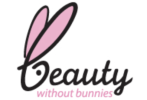
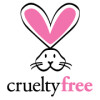
Beauty Without Bunnies
As seen on Anastasia Beverly Hills, Sol de Janerio,and Verb products
What it means: This brand does not test on animals.
Who’s in charge: People for the Ethical Treatment of Animals, better known as PETA. The international nonprofit’s mission is to stop animal abuse, and beyond beauty, PETA advocates for animal rights in the fashion, entertainment, and food industries. The organization has been criticized for its stance on animal euthenasia.
Note: PETA uses two logos.
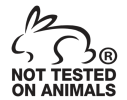
Not Tested On Animals
As seen on Andalou Naturals and Go-To products
What it means: This brand does not test on animals or make products from slaughtered animals. Additionally, none of these products include ingredients derived from fish or crustaceans.
Who’s in charge: Choose Cruelty Free (CCF), an Australia-based nonprofit largely run by volunteers. Their work is limited to surveying and accrediting beauty and household items for cruelty free practices.
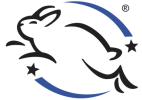
Leaping Bunny
As seen on Glossier, Dr. Loretta, and Ilia products
What it means: This product was not tested on animals nor made from ingredients that were tested on animals.
Who’s in charge: The Coalition for Consumer Information on Cosmetics (CCIC), a mega-nonprofit bringing eight formerly separate US and Canada-based animal rights groups together. The one you’re probably familiar with is the Humane Society
Vegan
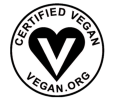
Certified Vegan
As seen on Dedcool, Briogeo, and Cocokind products
What it means: This product does not contain animal products or byproducts, animal byproducts were not used in the manufacturing process, and it has not been tested on animals.
Who’s in charge: Vegan Action, and their website Vegan.org, is a nonprofit organization with a mission to inspire veganism for ethical, environmental, and health reasons.
Note: Vegan Action does approve certain products or brands that fit the bill even if its larger parent corporation does not (for example Laneige US—it’s owned by Amorepacific, which largely does test on animals).
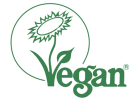
Vegan
As seen on Codex, Dear Dahlia, and Naturopathica products
What it means: This product neither tests on animals nor uses animal products or byproducts. Animals are defined as all vertebrates and all multicellular invertebrates.
Who’s in charge: The Vegan Society, an international nonprofit that actually coined the term ‘vegan’ in 1944.
Ecological Impact

FSC Certified
As seen on Versed, Milk, and Biossance products, in regards to paper packaging
What it means: The paper used to make this product comes from a responsibly managed forest, and was sourced in an ethical way. There’s no hazardous chemicals, disturbance of indigenous peoples, or harm to endangered environments, while conservation of biodiversity, minimized waste products, and regular forest health checks are encouraged.
Who’s in charge: The Forest Steward Council, an international nonprofit founded after several attempts at political deforestation treaties didn’t have the outcome environmentalists were looking for. The council is supported by environmental groups you’re probably familiar with, like WWF, Greenpeace, the National Wildlife Federation, and more.
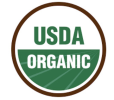
USDA Organic
As seen on Juice Beauty, Acure, and 100% Pure products
What it means: This product’s ingredients were grown organically, in a farm with ecologically responsible practices (like resource cycling, minimized use of synthetic materials, and conservation of biodiversity).
Who’s in charge: The Agricultural Marketing Service, a branch of the United States Department of Agriculture. If it sounds a little weird to you that such a governmental organization exists, you’re... not alone.
Note: A product labeled “Organic” and allowed to use the USDA seal must be 95-percent or more organic. Claims about being made with organic ingredients means it needs to be 70-percent or more organic. Additionally, while the term “organic” has a clear definition to the USDA, it’s not regulated by the FDA.
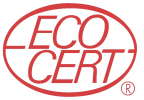
COSMOS (COSMetic Organic and natural Standard)
As seen in Kora Organics and Browfood products
What it means: A “natural” certification means that 50-percent or more of a product’s ingredients are plant-based, and a minimum of 5-percent of ingredients by weight are organic, while a “natural and organic” certification means 95-percent of the plant-based ingredients are organic and the organic ingredients make up 20-percent of the formula. (10-percent for products you rinse off.) In addition, packaging must be eco-friendly and certain petroleum-derived ingredients are banned.
Who’s in charge: Ecocert, a European environmental consulting company that specializes in doling out organic certifications across over 130 different countries. They’ll even help you get your USDA Organic certification, if you want.
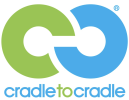
Cradle to Cradle
As seen on Garnier, Carol’s Daughter, and Henry Rose products
What it means: This brand succeeds across five categories (material health, material reuse, renewable energy and carbon management, water stewardship, and social fairness) when making this product.
Who’s in charge: The Cradle to Cradle Products Innovation Institute, which is not an institute in a classical sense as much as a nonprofit with scientists on all the major leadership committees.
Note: There are five achievement ratings, Basic, Bronze, Silver, Gold, and Platinum, to indicate how well a product fits the bill. The organization considers all ratings good ratings.
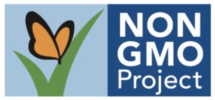
Non-GMO Project
As seen on Andalou Naturals, Dr. Bronner’s, and Now products
What it means: This product does not include ingredients that have been derived from genetically modified plants, and follows strict guidelines for testing, tracing, and separated manufacturing.
Who’s in charge: The Non-GMO Project, a nonprofit with the sole mission of making products made without GMOs identifiable to consumers.
Note: The Non-GMO Project defines genetic modification specifically as using recombinant DNA, or gene splicing, tech. Many scientists have pushed back on this idea, noting that humans have been selectively breeding and thereby changing the gene lines of plants and animals for centuries. Even the Non-GMO Project admits on their website that ““GMO Free” and similar claims are not legally or scientifically defensible.”
Social Impact

Fair Trade Certified
As seen on Cocokind, Palmer’s, and Nourish Organic products
What it means: This brand treats their employees fairly and ethically (and never utilizes child labor), has sustainable production practices, and minimizes their impact on both the earth and local communities all with a general mission to reduce poverty. Fair Trade ingredients are never GMOs.
Who’s in charge: Fair Trade USA, a non-profit organization. While the first Fair Trade certified product was coffee, over the years industries like personal care items, clothes, home goods, fish, and pretty much anything else that can be farmed have accepted this model.

Certified B Corporation
As claimed by Aesop, Davines, and Eminence
What it means: B Corps have to be committed to making some good in the world, from protecting the environment to providing a healthy environment for employees (with things like paid family leave and diversity initiatives) and creating safe-to-use products.
Who’s in charge: B Lab, a global independent nonprofit, and their group of Standards Analysts. Their board of directors is full of CEOs, COOs, founders, and company presidents.
Consumer Safety

EWG Verified
As seen on Summer Fridays, Son Reve, and Biossance products
What it means: This product lists everything that goes into it (including fragrance ingredients) and does not include any ingredient the EWG believes to be a health, ecotoxicity or contamination concern.
Who’s in charge: The Environmental Working Group, a DC-based nonprofit focused on research and transparency in toxic substances and pollutants, with a sister lobbying group to push these interests forward.
Note: Lots, and I mean lots, of credible scientists think the EWG’s methods and ratings are a load of phooey. Read more about that here.

Made Safe
As seen on True Botanicals, Loli Beauty, and Symbiome products
What it means: This product is not made with any ingredients known to be harmful to human health.
Who’s in charge: Made Safe, a nonprofit organization led in combination by Science Advisors (a panel of doctors and scientists) and Business Advisors (brand strategists, lawyers, product developers, authors, and entrepreneurs.
Note: While Made Safe often uses the term “non-toxic” in their materials, it’s important to remember that the dose makes the poison, and calling something non-toxic is a pretty effective marketing tool.

NEA Seal of Acceptance
As seen on Tower 28, Avène, and La Roche-Posay products
What it means: This product doesn’t include known skin irritants that can cause a reaction in sensitive and eczema-prone skin.
Who’s in charge: The National Eczema Association, a nonprofit led by patients, parents, doctors and nurses with first-hand eczema experience. Their Scientific & Medical Advisory Council, which advises the org, is full of eczema researchers and clinicians.
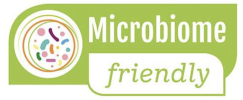
Microbiome Friendly
As seen on Beekman 1802, Biophile, and Prose products
What it means: The product is free from germs and fungi, preserves variety in the microbiome, doesn’t harm helpful bacteria, and doesn’t encourage the growth of harmful bacteria.
Who’s in charge: MyMicrobiome, an independent German organization founded and led by a microbiologist. Not a lot of information is available online.

National Psoriasis Foundation
As seen on Curél, Bioderma, and Cerave products
What it means: This product is safe to use for those with psoriasis, sensitive skin, and severely sensitive skin.
Who’s in charge: The National Psoriasis Foundation, a nonprofit organization pushing psoriasis medical research forward, as well as advocating for patients and providing helpful resources for those suffering from psoriatic disease. Their Medical Board is made up of over 30 MDs specializing in psoriasis, and their Scientific Advisory Committee is composed of 18 doctors and scientists.
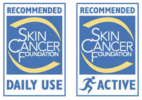
Skin Cancer Foundation
As seen on EltaMD, La Roche-Posay, and MD Solar Sciences products
What it means: This product meets criteria for safe and effective sun protection, which includes having a minimum of SPF 15, tests for irritation and toxicity on 20 human subjects, and substantiating water-resistance claims with data.
Who’s in charge: The Skin Cancer Foundation, which is led by dermatologists. Every product applying for a seal has its testing data reviewed by a team of photobiologists (a type of biologist that specializes in studying how UV radiation affects the skin—who knew!).
Photo via ITG





